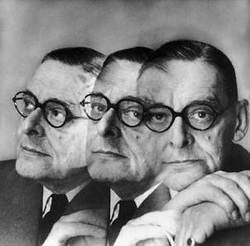
And what makes Eliot's poetry, and literary interpretation of his poetry, so difficult? His work’s mind-blowing preponderance of allusions, not just to literature but also to religion, mythology, anthropology, philosophy, history and science. Here I’m thinking of The Waste Land, arguably his masterpiece, as well as poems like The Hollow Men and Four Quartets. Eliot read everything and virtually all of it made its way into his poetry, usually in the form of allusions but sometimes in the form of quotations and partial rephrasings. (Incidentally, early in his career, the quotations, often without quotation marks, and partial rephrasings led to his being accused of plagiarism. Eliot — the über-modernist, writing in the early to mid 20th century — was sampling decades before hip-hop artists, the quintessential postmodernists, made sampling widespread within pop culture. But I digress...) To quote poet and Harvard professor Stephen Burt, before John Ashbery “the last figure whom half the English-language poets alive thought a great model, and the other half thought incomprehensible was probably T. S. Eliot.” Probably? No, definitely.

As difficult as Southam’s book can be (and will be if used correctly), you should read it first and then move on to other books of Eliot criticism. Just my advice as someone who unfortunately reversed the order. The Eliot criticism I read before Southam’s book — Denis Donoghue's Words Alone will do as an example — wasn’t all that helpful, but that was only because I should have read Southam’s book first. Southam is a good (and incredibly thorough) starting place. Donoghue, after all, cites the book repeatedly.
Some of you may be wondering, “Why even bother reading a poet as difficult as Eliot, especially since fully understanding him requires that you read scholarly books?” My answer? Eliot is worth the trouble. He’s one of the greatest English-language poets of the twentieth century and has had a deeper influence on my poetry than I care to admit. For me, gaining a greater understanding of his work is a tremendous boon. As Ezra Pound put it, “The more we know of Eliot, the better.”
 RSS Feed
RSS Feed